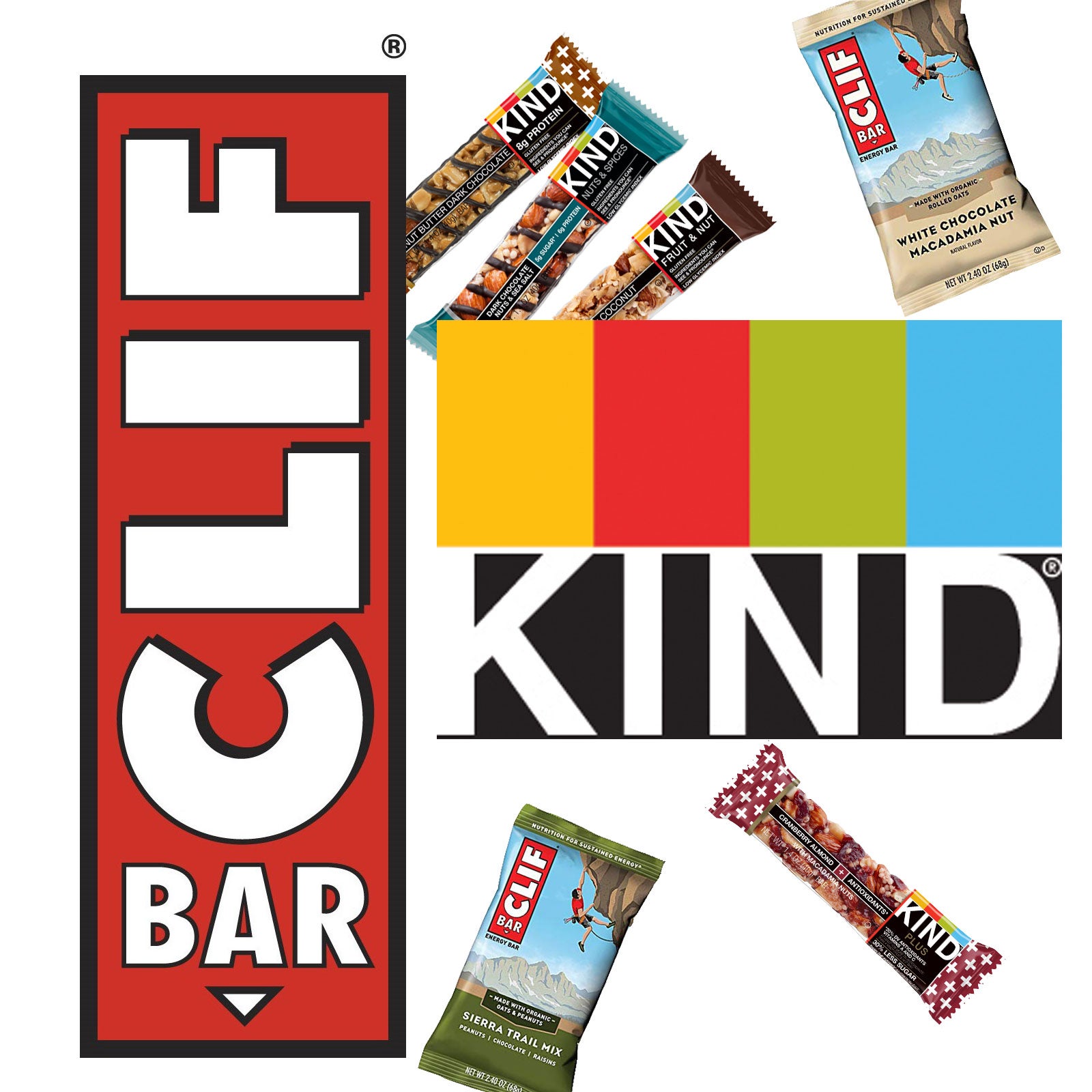Energy-bar giant Clif bar and snack-bar maker Kind are fighting over whose products have the best ingredients. The squabble came to a head on Monday, when Kind released a TV ad criticizing Clif for the high sugar content of its classic chocolate chip energy bar.
https://youtube.com/watch?v=gJrHjm6NUPo
The 30-second spot shows a couple seated on an airplane. The man opens a Clif bar wrapper, empties it onto his tray, and looks disgusted when he finds a puddle of brown rice syrup. The woman opens a Kind bar wrapper and dumps out its contents: almonds. “Did you know that the first ingredient in this Clif Bar is brown rice syrup, which is just another name for sugar?” the narrator says. The spot goes on to highlight the fact that Kind’s dark chocolate nuts and sea salt bar has 75 percent less sugar than “the leading Clif Bar.” (Clif’s chocolate chip variety has 21 grams to Kind’s five.)
It’s the latest volley in a battle that began in March, when Clif took out a full-page ad in The New York Times calling on three competitors—Kind, Larabar, and RxBar—to start using organic ingredients. “Clif’s approach in selling snacks made predominantly from organic brown rice syrup, which is basically sugar, isn’t the solution,” responded Kind CEO Daniel Lubetzky. One month later, Kind unveiled a campaign publicizing the total amount of sugar in bars, cereals, granolas, and yogurts from a handful of leading companies including Clif.
Another month passed, and in mid May, Clif aired its first-ever TV ad, centered around the fact that Clif products are “good and nutritious, not full of poison.” Both brands say they had been planning their respective ads for months, or in some cases years—that is, they weren't acting in response to one another. Kind's latest ad, though, is more direct, and more aggressive, calling out Clif—and only Clif—by name and taking pointed digs at the company’s most well-known product. It will run on TV and across social media for the next four weeks.
Brands using advertising to criticize competitors’ products is nothing new. For the better part of the seventies and eighties, Coca-Cola and Pepsi fought for market share in what’s now known as the . Lindsey Bier, a professor of business communication at the University of Southern California, points to another more recent example: in the late aughts, Campbell’s and Progresso in a series of ads about MSG in one another’s canned soups.
In general, Bier says that these kinds of antagonistic campaigns “signal a market with intense competition.” That’s certainly the case with bars. The food group originated as a high-calorie, sugar-dense fuel for hard-charging endurance athletes but now comprises a crowded $5 billion industry filled with dozens of companies, big and small, whose primary customers are simply looking for something to eat at their desk.
That point is at the heart of Clif and Kind’s spat. A Facebook post about Kind’s new sugar-focused TV ad quickly devolved into a comment thread between the two brands, centering around whose bars have more sugar, which bars are more appropriate for the everyday snacker, and which brand has demonstrated a higher commitment to clean ingredients. Clif pointed out that it makes several snack products—Nut Butter Filled, Mojo, Whole Lotta bars—that lead with whole ingredients like fruit, nuts, and oats and boast sugar contents much closer to that of a Kind bar. “So you’re saying people shouldn’t eat Clif Bars as an everyday snack because of all the sugar?” Kind countered. Clif hit back on the grounds that Kind is partially owned by Mars, which also makes M&M’s and Snickers. Kind called Clif’s packaging “deceptive” for not labeling brown rice syrup as sugar. And so on and so forth.
The fight comes down to the fact that Clif and Kind products are in direct competition with one another, even though they were designed for very different uses. “We chose Clif’s chocolate chip bar because it’s their number-one-selling product and it’s typically found on the same shelf as our number-one-selling dark chocolate nuts and sea salt bar,” a Kind representative told ���ϳԹ���. “We have good reason to believe that only a small percentage of Clif Bar consumers are eating a Clif Bar while engaged in intense physical activity like climbing a mountain. Since our founding, it’s been our mission to empower consumers to know what they’re eating.”
For its part, Clif says its inital callout to Kind, Larabar, and RxBar was an attempt to both nudge the food industry toward organic ingredients and to bust through misconceptions about brands that are considered organic but aren’t. “Some of these companies are using ‘better for you’ marketing as a halo that makes people think they’re organic” Kit Crawford and Gary Erickson, Clif Bar cofounders and co-CEOs wrote to ���ϳԹ���. “They’re not.” The cofounders say their original campaign has been a success but express frustration with Kind’s response. “Frankly, it’s disappointing to see Kind continue to demonize ingredients without proper context,” they wrote. “It’s self-serving and misleading.”
Melinda Manore, a professor of nutrition at Oregon State University, notes that sugar is not categorically bad. In fact many athletes need it. “If I’m recommending something to someone who does exercise a fair amount, I’m going to recommend something that has sugar in it,” she said in response to Kind's initial campaign on sugar. “You need sugar. You have to fuel your brain with something that’s fairly quick and easy to take with you.”
Ultimately though, as Bill Pearce, a professor of brand marketing at the University of California at Berkely, points out, a campaign like this isn’t actually about what’s better for the customer. “It’s a disservice to the consumer,” he says. “If you want to be seen as a valuable supplier, you have to grow the category rather than trying to steal market share from another company. This is the antithesis of that. This is just a petty squabble.”
Are Clif and Kind on the road to becoming the Coke and Pepsi of the outdoor nutrition world? Pearce doesn’t think so. “Kind is just matter-of-fact slapping Clif around,” he says. “I think they’re doing that in an attempt to stop this.” In the meantime, we can all go back to being overwhelmed by the number of bar choices at the grocery store.


